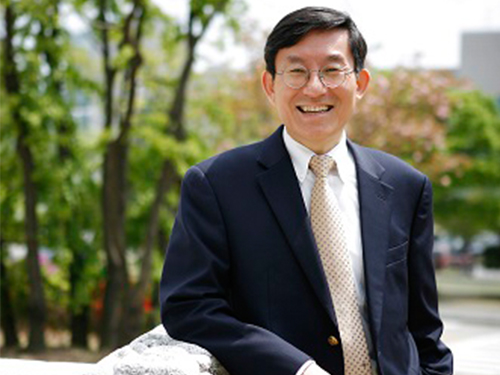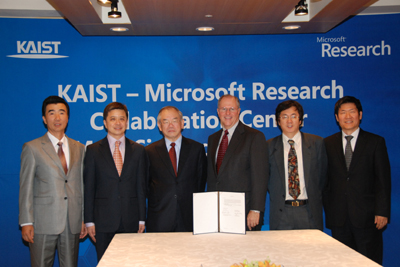Asian+Region
-
 Professor Yim Appointed As Associate Editor of Nuclear Technology
Professor Man-Sung Yim from the Department of Nuclear and Quantum Engineering was appointed as the associate editor (for the Asian region) of Nuclear Technology ― a leading international research journal of the American Nuclear Society. Professor Yim will serve his term for three years from May 2019.
The American Nuclear Society, established in 1954, is comprised of more than 11,000 global members and aims to advance nuclear science, engineering, and technology while supporting the peaceful and beneficial applications of nuclear energy. Since its first publication in 1971, Nuclear Technology has been a representative journal of the society, reporting state-of-the-art information on all phases of the practical applications of nuclear technology.
Professor Yim is being recognized worldwide for his pioneering nuclear education, research, and policy studies in the fields of non-proliferation, safeguards for severe accident management, and waste management. He served as the head professor of the Department of Nuclear and Quantum Engineering and established the Nonproliferation Education and Research Center (NEREC) at KAIST.
Professor Yim remarked, “Asia has an important role to play at the forefront of the world’s nuclear research considering that nuclear development is most actively being carried out in the Asian region these days.”
2019.05.17 View 9708
Professor Yim Appointed As Associate Editor of Nuclear Technology
Professor Man-Sung Yim from the Department of Nuclear and Quantum Engineering was appointed as the associate editor (for the Asian region) of Nuclear Technology ― a leading international research journal of the American Nuclear Society. Professor Yim will serve his term for three years from May 2019.
The American Nuclear Society, established in 1954, is comprised of more than 11,000 global members and aims to advance nuclear science, engineering, and technology while supporting the peaceful and beneficial applications of nuclear energy. Since its first publication in 1971, Nuclear Technology has been a representative journal of the society, reporting state-of-the-art information on all phases of the practical applications of nuclear technology.
Professor Yim is being recognized worldwide for his pioneering nuclear education, research, and policy studies in the fields of non-proliferation, safeguards for severe accident management, and waste management. He served as the head professor of the Department of Nuclear and Quantum Engineering and established the Nonproliferation Education and Research Center (NEREC) at KAIST.
Professor Yim remarked, “Asia has an important role to play at the forefront of the world’s nuclear research considering that nuclear development is most actively being carried out in the Asian region these days.”
2019.05.17 View 9708 -
 KAIST, Microsoft Research to Set up Research Collaboration Center
KAIST, Korea"s premier institution for science and technology research and education, and Microsoft Research (MSR), the research arm of Microsoft Corp, signed a memorandum of understanding (MOU) to establish a joint research collaboration center in Korea on Oct. 20.
The research collaboration center to be located at the KAIST campus in the Daedeok science and technology town 150 kilometers south of Seoul will be dedicated to promoting joint researches, curriculum innovation, talent fostering and academic exchange in the Asian region.
The MOU signing ceremony at the Westin Chosun Hotel in Seoul was attended by President Nam-Pyo Suh and Vice President Soon-Heung Chang from KAIST, and Craig Mundie, Chief Research and Strategy Officer of Microsoft Corp, and Hsiao-Wuen Hon, Managing Director of MSR Asia from Microsoft.
“We are excited to be working so closely with Microsoft Research,” KAIST President Suh said. “This is the first of many alliances we hope to establish with the world’s industrial leaders that will enable us to resolve some of the toughest problems in computer science and accelerate the next generation of innovation in computing technology and its application in other scientific researches.”
Dr. Hon said: “For over 10 years, Microsoft Research has been committed to working with leading universities throughout Asia to spur computer science research and to strengthen Asia’s knowledge economies by helping foster their capabilities. The Microsoft-KAIST Research Collaboration Center demonstrates our continued efforts to strengthen relations with universities in Korea and build new partnerships with academia here.”
In the last three years, Microsoft Research and KAIST have engaged in close collaboration through research projects, student support programs, and various academic exchange activities. One of the major projects was to construct software development library specifically dedicated to systems biology. A number of excellent students from KAIST participated in the internship program at Microsoft Research in Beijing, China and Redmond, United States.
The establishment of the Microsoft-KAIST research collaboration center will bring the collaborative relations between KAIST and MSR to a new level. The center will provide a platform which unites the innovative minds of KAIST and Microsoft Research to develop technologies that will impact the way people live, learn, work, and play, a KAIST spokesman said.
2008.10.30 View 20388
KAIST, Microsoft Research to Set up Research Collaboration Center
KAIST, Korea"s premier institution for science and technology research and education, and Microsoft Research (MSR), the research arm of Microsoft Corp, signed a memorandum of understanding (MOU) to establish a joint research collaboration center in Korea on Oct. 20.
The research collaboration center to be located at the KAIST campus in the Daedeok science and technology town 150 kilometers south of Seoul will be dedicated to promoting joint researches, curriculum innovation, talent fostering and academic exchange in the Asian region.
The MOU signing ceremony at the Westin Chosun Hotel in Seoul was attended by President Nam-Pyo Suh and Vice President Soon-Heung Chang from KAIST, and Craig Mundie, Chief Research and Strategy Officer of Microsoft Corp, and Hsiao-Wuen Hon, Managing Director of MSR Asia from Microsoft.
“We are excited to be working so closely with Microsoft Research,” KAIST President Suh said. “This is the first of many alliances we hope to establish with the world’s industrial leaders that will enable us to resolve some of the toughest problems in computer science and accelerate the next generation of innovation in computing technology and its application in other scientific researches.”
Dr. Hon said: “For over 10 years, Microsoft Research has been committed to working with leading universities throughout Asia to spur computer science research and to strengthen Asia’s knowledge economies by helping foster their capabilities. The Microsoft-KAIST Research Collaboration Center demonstrates our continued efforts to strengthen relations with universities in Korea and build new partnerships with academia here.”
In the last three years, Microsoft Research and KAIST have engaged in close collaboration through research projects, student support programs, and various academic exchange activities. One of the major projects was to construct software development library specifically dedicated to systems biology. A number of excellent students from KAIST participated in the internship program at Microsoft Research in Beijing, China and Redmond, United States.
The establishment of the Microsoft-KAIST research collaboration center will bring the collaborative relations between KAIST and MSR to a new level. The center will provide a platform which unites the innovative minds of KAIST and Microsoft Research to develop technologies that will impact the way people live, learn, work, and play, a KAIST spokesman said.
2008.10.30 View 20388